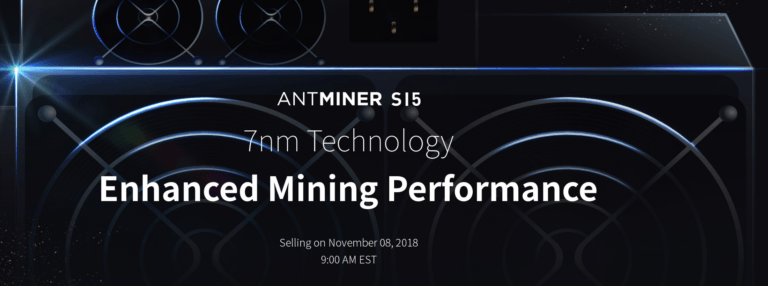Bitmain, the largest cryptocurrency hardware miner manufacturer, has announced its latest application-specific integrated circuit (ASIC) hardware SHA256 miners, the Antminer S15 and T15 (there currently are no details as to the models’ respective features or differences).
The new ASICs feature seven nano-meter (7nm) circuit architecture, according to a tweet from the official Bitmain twitter account, which is the only press release to be issued thusfar.
We are officially announcing the release of our new 7nm miners which possess industry-leading hash rates designed to mine with the SHA256 algorithm. Two models will be offered, the Antminer S15 and T15. Available for purchase on 11/8. pic.twitter.com/m6HbWGZS1O
— BITMAIN [Not giving away ETH] (@BITMAINtech) November 6, 2018
No precise specifications are available at this time with regard to hash rate and wattage (the official specs webpage is still empty), but it is reasonable to presume that the new miners will utilize the BM1391 chipset that Jihan Wu, Bitmain’s co-founder and principal media personality, announced in September.
As CryptoGlobe reported at the time, the chipset uses a seven nanometer “FinFET” architecture and is designed for extreme efficiency, producing one terahash/42 joules, or approximately 23,800 megahash per joule (mh/j) of energy. Bitmain’s most formidable current competitor, the Ebit E10, hashes at roughly 11,000 mh/j, and Bitmain’s own previous top-of-the-line miner, the S9, hashes at about 10,000 mh/j.
The miners will go on sale on 8 November, according to both the product page and the Bitmain official tweet.
A helpful boost
Bitmain’s release comes during a time of both controversy and competition for the paragonal crypto-mining company. It faced criticism in September, as it solicited investments to its initial public offering (IPO) on the Hong Kong stock exchange, for allegedly trying to obfuscate the degree of its losses during the year.
By the same token, Bitmain allegedly made false claims to potential IPO investors, according to claims made by Coindesk based on private sources. Those claims, if true, could land Bitmain into legal trouble in Hong Kong. Even international politics have been unkind, with the U.S.-China trade war threatening to take a big bite out of Bitmain’s largest source of revenue, international exports of its ASIC miners.
On the subject of hashrate, Bitmain recently re-enable a controversial software option, ASICboost, for its miners’ firmwares. The software is controversial both for legal reasons – a question of patent infringement – and because some claim that it is a malicious exploit of the Bitcoin hashing algorithm. ASICboost does not function with Segwit-enabled Bitcoin transactions, which is perhaps why Bitmain has been observed rejecting Segwit transactions on its proprietary mining pool, Antpool.









